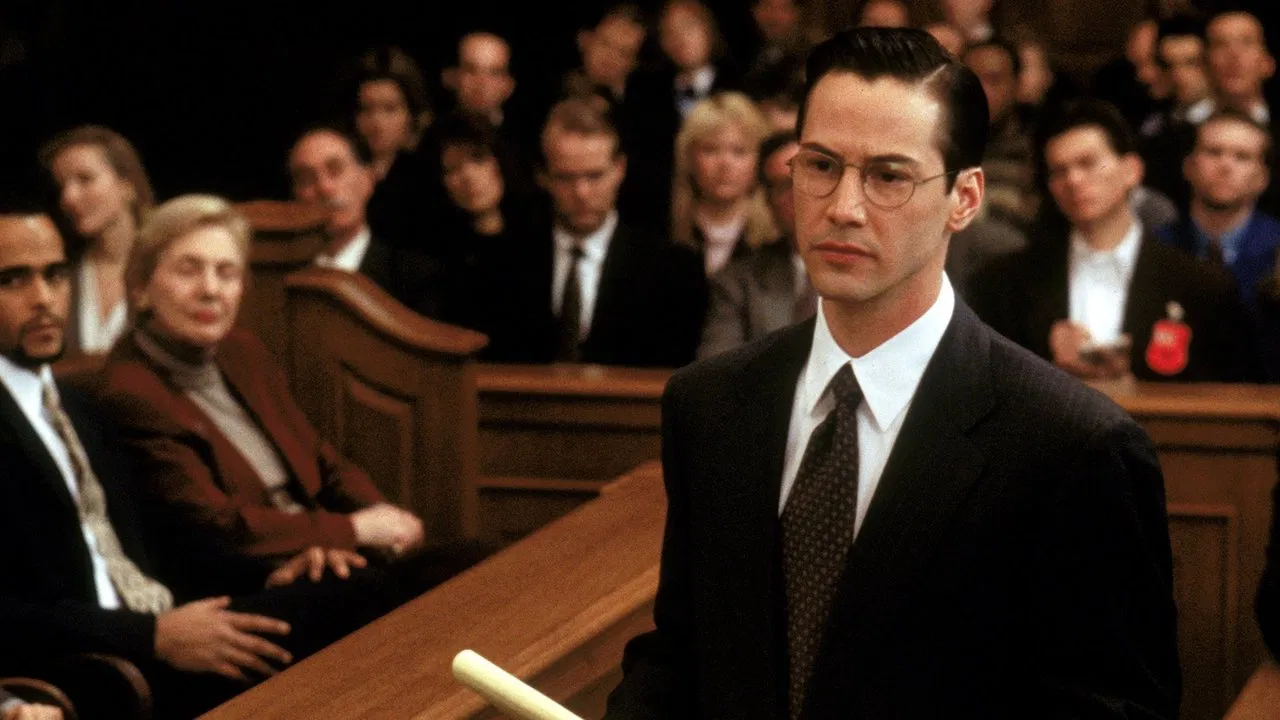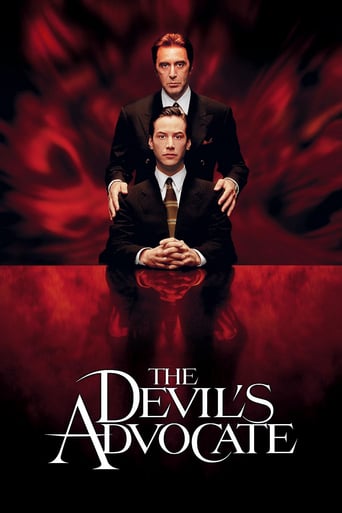

Better Late Then Never
... View MoreOne of the best movies of the year! Incredible from the beginning to the end.
... View MoreWorth seeing just to witness how winsome it is.
... View MoreActress is magnificent and exudes a hypnotic screen presence in this affecting drama.
... View MoreIn my opinion,this is one of the best movies of all time. I'm shocked that it has no Oscar nominations. Pacino definitely deserves one for almost every movie he was in. But it won Saturn award for the best horror... really?! Horror?! In which universe is this movie a horror?! It's drama, it may pass for thriller or mystery, but to say it's horror is complete nonsense. I suppose everyone saw this movie, but to those who saw it just once I recommend watching it again, because this movie is full of ingenious lines that in first watching mostly pass unnoticed, because without knowing how movie ends they seem casual and irrelevant, and they're not. In spite of the fact that the main role is entrusted to Keanu Reeves, the story and other actors are so strong that the film is a pure10/10
... View MoreNon-need to be interested, in the need to analyse, is need to be interested in the redundancy of analysis.Necessary interest is boring redundancy. The redundancy of analysis is the necessity of freedom.Boring redundancy is boring boredom. The necessity of freedom is boring oppression. Boring oppression is boring boredom. Boring boredom that's boring boredom is insincere boredom that's insincere boredom. Insincere boredom is sincere excitement.Sincere excitement of sincere excitement is the illusion of excitement that's self-created - true boredom that's free.Free true boredom is free free boredomFree free is the experience of freedom.The experience of freedom is the freedom of experience.The freedom of experience is the limitlessness of experience - the experience of limitlessness.An experience of limitlessness that's boring is an experience of limit that's exciting.The experience of limit is the illusion of limit - insincere limitAn insincere limit is a limited insincerity. A limited insincerity is an oppressed deception - a weak deception.A weak deception is a deceptive deception - a deceptive deception is a betrayal of betrayal.A betrayal is not origin. Betrayal is reaction.A reaction to betrayal that's exciting is a non-reaction to origin that's exciting.A non-reaction to origin is a non-reaction to God.A non-reaction is not not. Not not is deceptive.Non-reaction is meant to be nothing. Intended nothing is deceptive intent.The deception of deceptive intent is a betrayal of deceptive intent. A betrayal of deceptive intent is a betrayal of the illusion of deception.The deception of a false illusion is the deception of an intended illusion - the intent of a false illusion.The intent of a false illusion is the mission of a lie that's a lie. A lie that's a lie is a lie that behaves.A lie that behaves is a lie that's alive. A lie that's alive is a truth of no life. Life isn't real, but the illusion has the ability to be a mission. God can create a lie, and then God can intend for the lie to live an identical existence to God despite the lie having none of God's powerGod can create God, and the imitation can be 100% identical despite having no power
... View MoreOK, full disclosure, I have a thing for Al Pacino. I'll watch just about anything he's in and...if he screams and yells a monologue in it, if he delivers a diatribe of rage....yeah I get flashbacks to him screaming: "I'd take a flame thrower to this place" and roll my eyes back like a shark in a feeding frenzy.Oh, yeah, almost forgot, Keanu is in this one too...but for a good slice of the film he doesn't play the most savory of characters and, really, honestly, he just seems too nice to play a lawyer......but despite that he does a pretty good job of exhibiting the ego that has to come with the law profession...just not the vile evilness. So, I can't totally fault him for miscast as I could for Dracula.Jeffery Jones is in there too and due to recent revelations he totally fits the sleazy lawyer role.But yeah, 1997, the 90s had a way with films that was only really beaten by the 70s and The Devil's Advocate is one of those films that could really only be made in those two decades. Stand alone horror not intended as a franchise piece and one with a twist that asks you to think a little.No way that would be made today and that is a shame.I could tout its glory, but really, honestly, the movie could have stank and I wouldn't care thanks to Pacino screaming "I'm a fan of man!" It's worth the watch.
... View MoreSelf-reflexivity in artistic works serves to remind the audience that they are viewing a cultural product. It prevents their becoming so involved in the text that they do not think critically about the message. The presence of the mirror during various scenes of The Devil's Advocate serves as a self-reflexive device to highlight the major themes of the film, namely duality, free will and truth. These important mirror scenes propel the plot action to Kevin's ultimate downfall and rebirth.The mirror first appears during the Gettys trial when Kevin is faced with a crossroads. He faces his reflection, and negotiates with himself in the mirror. The duality of seeing both him and his reflection highlights a struggle between good and evil. While Kevin sells his soul (ethic and morals) and makes his pact to keep his record clean, he does not wear his wedding ring. This recalls previous texts in which marriage is an institution frowned upon by the Devil. The sinking sound of the toilet flush and thunder with the rip of the paper towel further emphasize this crossroads scene. His decision to defend Gettys despite his knowledge highlights his pride. He is unwilling to lose a case and mar his unblemished record. The mirror sequence underscores his decision which propels the action forward, whereby Milton takes notice of him and lures him to New York.When Kevin meets Milton, the two are reflected in a man-made lake on the rooftop. The body of water often symbolizes the unconscious and deep, submerged truths. This scene foreshadows the final climax when Milton reveals that he is Kevin's father and that he values man-kind above all else. At this mirror/reflection scene Milton asks "you don't really want to go back to Florida, do you?" and Kevin decides he does not. This decision, emphasized by the mirror, propels the action again by allowing Mary Anne and Kevin to move to New York despite his mother's warnings. This is another crossroads, a time when he could have resisted his egotism.For Mary Anne, the mirror does not emphasize a crossroads, but truth. Milton looks at her over her shoulder at Eddie Barzoon's party, and the two are reflected in the mirror. It shows Mary Anne's desire to have someone standing there next to her. She is very lonely, and this scene is intercut with the first instance of Kevin bailing on her. He puts his work before her, leaving her alone.While in the dressing room with her new friends, one woman admits she had a boob job while another worries about her hips. The two women stand in front of mirrors admiring themselves, but Mary Anne sees the true self and not the reflection. These self-absorbed women, spending money and drinking, are monsters. She sees one morph into a hideous creature, while the mirror in front of her emphasizes the deception of appearances. It is Mary Anne who realizes first why she is being punished. She values the money and the apartment too much. She was taken in by the appearance, but the reality is far different. The mirror emphasizes the duality.At the hospital, Mary Anne refuses to look in the mirror because she thinks she will see a monster. She accepted blood money through Kevin's acquittals since she knew all those people were guilty. This emphasizes the mirror's ability to reveal true identity that later manifests with Pam. Evil had followed Mary Anne into her room in disguise, but the reflection revealed her true form. Mary Anne crashes the mirror at exactly the climax of Kevin's mother's story. Kevin had been running away and not listening to her, but after the incident he allows his mother to reveal that Milton is his father. The two scenes intercut emphasize the mirror as a teller of truth and discovering one's true identity. It is significant that Mary Anne kills herself with the mirror, because the truth hurts.Another mirror scene occurs while Kevin and Milton are at the boxing match. While on the phone with Mary Anne, Kevin spies a woman wearing a red dress in front of a mirror. As he's looking, he tells Mary Anne not to wait up, that he does not know when he will be home. This decision that he makes, in light of the fact that Milton is his boss and pays for their apartment and bills, is intercut with Mary Anne's dream that her ovaries are removed. Kevin's decision propels the action by leading to her first hysterical moment when he will take her to a doctor. The woman in red symbolizes evil, and she is alone. Perhaps it suggests the isolation of Mary Anne on the other side of the phone to whom he is speaking while looking at another. The woman reflects on the blood color of her dress that Maryanne will soon see. The reflection foreshadows the reality.In the final mirror scene, Milton dies and returns Kevin to the Gettys trial, in front of the mirror where it began. Kevin squints looking at his face, searching himself. His decision to kill himself propels the plot further and brings him back to himself. The cyclical nature of identity is further emphasized when Kevin abandons the trial, but relents to an interview when Larry calls him a star. Milton repeats that vanity is his favorite sin.These various mirror scenes emphasize key themes in the film. Because the mirror scene in the Gettys case frames the film, it is obvious that there are two paths to take. History will repeat itself in a different way the next time around, but there is no escape from the self. Kevin faces himself and makes a decision to support the case, and the second time to drop it. Mary Anne makes a decision to kill herself. Their decisions embody the philosophy of free will, and have very real consequences propelling the story forward.
... View More